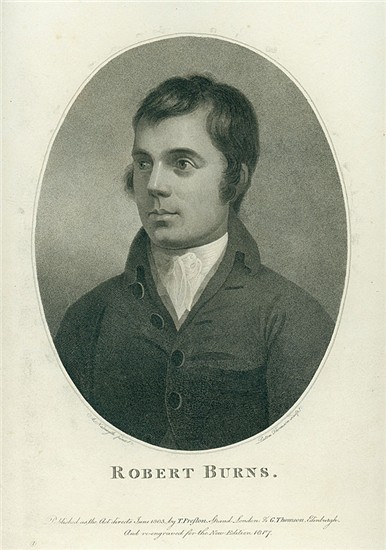 Head and shoulders portrait of Robert Burns after a painting by Alexander Nasmyth
Head and shoulders portrait of Robert Burns after a painting by Alexander Nasmyth
Head and shoulders portrait of Robert Burns after a painting by Alexander Nasmyth
In the early 1790s the Scottish music collector George Thomson approached Robert Burns, asking for help in compiling and editing his Select Collection of Original Scotish Airs. Burns readily agreed (although with the proviso that his name not be attached to the publication), and the nearly 60 letters from Burns to Thomson that survive are filled to the brim with working and fair copies of some of Burns’s most famous songs.
One letter, written in early September of 1793, discusses in detail no fewer than 74 songs – and it is within this letter, buried nearly at the end, that we find his full text to Auld Lang Syne.
When introducing the song, Burns says: "The air is but mediocre; but the following song, the old song of the olden times, & which has never been in print, nor even in manuscript, untill I took it down from an old man's singing, is enough to recommend any air."
Robert Burns left us four copies of Auld Lang Syne, and the one you see here varies slightly from the other copies. Burns has written what is usually the second stanza (beginning "And surely ye'll be your pint stowp!") at the very end, and he has used the term "Dear" (instead of "jo") in the Chorus.


Auld Lang Syne, in a letter from Robert Burns to George Thomson, Nov. 1794 (MA 47.27)
Robert Burns left us four copies of Auld Lang Syne, and the one you see here varies slightly from the other copies. Burns has written what is usually the second stanza (beginning "And surely ye'll be your pint stowp!") at the very end, and he has used the term "Dear" (instead of "jo") in the Chorus.
For more information about this letter, click here.
The Leon Levy Foundation is generously underwriting a major project to upgrade catalog records for the Morgan's collection of literary and historical manuscripts. The project is the most substantive effort to date to improve primary research information on a portion of this large and highly important collection.
